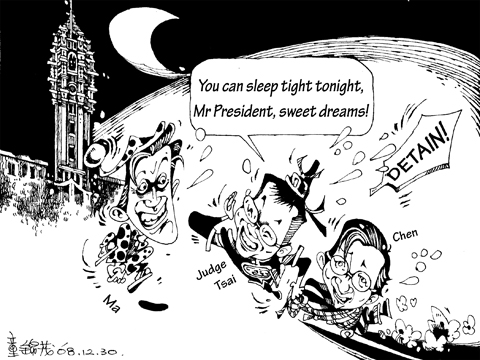
New one-party state even worse
By Lu Shih-hsiang 盧世祥
Wednesday, Dec 31, 2008, Page 8
‘It can be said that the new one-party state has not inherited the old
regime’s competence in running the country, but it matches the Chiang regime in
its willingness to use police-state methods to keep the people under control.’
The Taipei Society recently published a report titled Deconstructing the New
One-Party State (解構新黨國) that admonishes President Ma Ying-jeou (馬英九) and his
administration on issues including the economy, sovereignty, human rights and
government.
The report makes 10 suggestions, one of which is replacing the premier. It
asserts that Ma’s government has been incompetent in dealing with a series of
domestic and international economic crises that have hit Taiwan since its
accession seven months ago, while the number of unemployed has reached at least
500,000, making Taiwan’s unemployment rate the highest among the Four Asian
Tigers.
The Taiwan Society calls Ma’s regime a “new one-party state” because, with its
complete control of the state apparatus, the government has restricted the
public’s freedoms of assembly and parade, infringed on judicial rights and
suppressed freedom of speech, while at the same time leaning heavily toward the
autocratic Chinese regime. All in all, Taiwan’s state and society are regressing
in many ways.
The “new one-party state” is fundamentally no different from the old one-party
state that controlled Taiwan under dictator Chiang Kai-shek (蔣介石) and his son
Chiang Ching-kuo (蔣經國) after World War II. Just like the Chiangs, the Ma regime
has used police brutality against dissidents and manipulated the judiciary,
while the media assist the government in brainwashing the public and hounding
the ruling party’s political enemies. Moreover, the Ma regime is controlled by a
minority, just as the old one was.
While the past dictatorship allocated government jobs according to birthplace,
the majority of posts in Ma’s Cabinet are held by Mainlanders, although they
account for only 14 percent of Taiwan’s population. The 228 Incident and White
Terror of yesteryear were examples of ethnic politics, and so are the policies
of the Chinese Nationalist Party (KMT) now that it has returned to power under
the guise of democratic elections.
However, the old and new one-party states are not equal in quality of
performance. Although under the old regime the legislature was accused of being
a mere department of Cabinet, at least the formality of legislative review did
take place. Last month, however, when Taiwan’s Straits Exchange Foundation
signed four agreements on direct cross-strait transport links with its Chinese
counterpart, the legislature was not even allowed to function as a rubber stamp.
In terms of competence, the old regime oversaw Taiwan’s industrialization and
steady economic growth and guided it through energy and financial crises. In
contrast, the Ma administration has proved its incompetence by implementing
unrealistic economic policies that have led to an economic downturn and provoked
widespread public discontent after just a few months of government. Now that the
global financial storm has arrived, there is even greater cause for worry.
It can be said that the new one-party state has not inherited the old regime’s
competence in running the country, but it matches the Chiang regime in its
willingness to use police-state methods to keep the people under control.
Above all, the old one-party state kept to its anti-communist principles and
aligned itself with advanced countries like the US and Japan. As a result,
through the great efforts of its own people and under benign foreign influence,
Taiwan’s economy and politics advanced, and democracy and prosperity were
finally achieved.
In contrast, the Ma government’s insidious intentions and pro-China policies
have led to a rapid economic meltdown and set back Taiwan’s democratic
development. This government has abandoned the “three-noes” policy of the old
regime — no negotiation, no contact with and no concessions to China — even to
the extent of ordering national flags to be taken down during the visit of
Chinese envoy Chen Yunlin (陳雲林), and again upon the arrival of the two giant
pandas from China.
All things considered, the performance of the new one-party state must have
Chiang Kai-shek and Chiang Ching-kuo turning in their graves.
Lu Shih-hsiang is an adviser to the Taipei
Times.